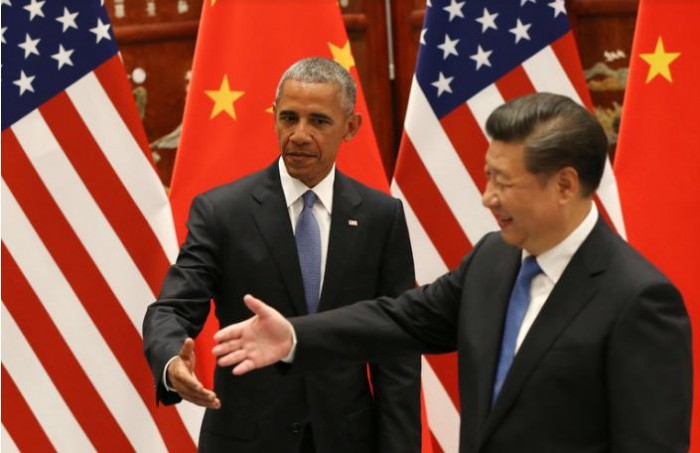Media Report

- The New York Times reports: "As China challenges the United States for influence in Asia, the administration is concerned that any criticism of nations like Malaysia,Vietnam, the Philippines and Laos for backsliding on human rights could alienate them rather than pulling them closer. At the same time, shining a spotlight on China's own rough treatment of dissidents risks losing Beijing's cooperation on issues like trade, climate change and nuclear proliferation....'Decades of experience should make clear to Washington that Beijing responds only to the expectation of unpleasant consequences,' said Sophie Richardson, the China director for Human Rights Watch. 'Why not threaten sanctions, cut out the pointless pomp or visibly align with peaceful critics of the government?' she said. 'On other diplomatic, economic and security issues, governments recognize and use these points of leverage. Why not on human rights?'...Others say Mr. Obama, who speaks openly about civil rights in the United States, has been wise not to inject the issue into talks with China...They say the president understands that a more powerful China is better able to resist American pressure on human rights than it was a decade ago."
- The Washington Post reports: "President Barack Obama put the long-simmering dispute in the South China Sea front and center on the agenda at a regional summit Thursday as it became clear that most of the other leaders gathered in the Laotian capital were going to let China off with a mild rebuke over its territorial expansion in the resource-rich waters....ASEAN held a separate meeting later Thursday with eight world powers, including China and the U.S, in a gathering known as the East Asia Summit. The participants were expected to let China off with a muted reprimand over its expansionist activities in South China Sea, according to a draft of their joint statement. The final version was not immediately released....Referring to the arbitration panel's ruling that invalidated China's territorial claims, Obama said, 'I realize this raises tensions but I also look forward to discussing how we can constructively move forward together to lower tensions and promote diplomacy and regional stability.'"
- The Economist comments: "Six of the 70 people who won seats in the territory's Legislative Council, known as Legco, were people who want Hong Kong to be more independent from China....As the Communist Party in Beijing sees it, it is the composition of the opposing camp, not its slightly bigger size, that is a cause for much anxiety. Gone from Legco are several veterans who have been vocal critics of the party (which operates only covertly in Hong Kong)....China's initial reaction to the results in Hong Kong has been guarded (beyond trying, as usual, to scrub the internet clean of any comment on the territory's democratic endeavours). Its media have barely mentioned them. But the leadership's worries are clear. A government statement said that advocating independence for Hong Kong was 'a threat to China's sovereignty and security' and would damage the prosperity and stability of Hong Kong. It expressed support for any legal action taken by Hong Kong's government to stop it."
Calendar
- 2016-09-07 Tensions over South China Sea belie summit cordiality
- 2016-09-06 Global leaders test limits of spreading wealth
- 2016-09-05 Seeking smoother summit, ASEAN to skirt mention of South China Sea ruling
- 2016-09-04 China, US talks 'extremely productive'
- 2016-09-02 Hangzhou G20: China's ambitions for global leadership
- 2016-09-01 Obama Heads to Asia Seeking Breakthrough on Trade and Climate Change
- 2016-08-31 China Will Have to Get Used to Being a Terrorist Target
- 2016-08-30 China’s Passive-Aggressive Diplomacy
- 2016-08-29 Why China won’t own next-generation manufacturing
- 2016-08-28 Beneath Yuan's Quiet, China Worries Rise
News
- The New York Times Pressing Asia Agenda, Obama Treads Lightly on Human Rights
- The Washington Post Obama puts South China Sea back on agenda at summit
- Bloomberg Markets China Exports Cushioned by Weaker Yuan as Imports Rebound
- The Wall Street Journal Chinese Exports Slow Their Decline; Imports Increase
- Reuters In North Korea, China's Xiaomi gets the people's pulses racing
- BBC News China protest village leader Lin Zuluan convicted
- The New York Times Southeast Asia Issues a Non-Rebuke to China
- Reuters Hong Kong stocks rise as inflows from China intensify
- The Wall Street Journal For Apple's iPhone 7, China Is a Challenge
- The Washington Post China shuns Seoul security dialogue amid missile defense row
- The Financial Times Michael Owen seeks to capitalise on China's football revolution
- Bloomberg Markets Apple's Latest iPhone Can't Help It Turn the Tide in China
- The Guardian Great Helmsman or ruinous dictator? China remembers Mao, 40 years after death
Commentary
- Bloomberg View The U.S. Should Make China a Partner in Space
- Bloomberg Gadfly In China, Black Is the New Green
- The New York Times: Sinosphere Air China Will Fly You to London, and Warn You About Dark-Skinned People There
- The Economist The city that scares China
- The New York Times: Sinosphere China Censors Critic's Discussion of Family Planning Policies
- Foreign Policy China's Gold Rush in the Hills of Appalachia
- The Wall Street Journal: China Real Time A China-Style Apple Launch